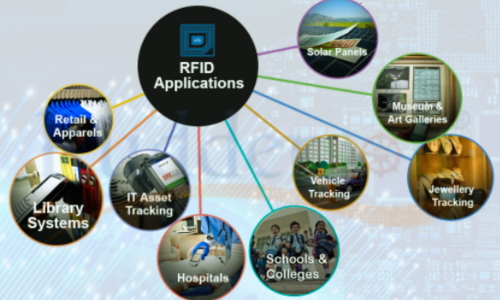
What is RFID Technology?
Radio Frequency Identification (RFID) technology automatically identifies, and tracks tags attached to objects using electromagnetic fields. The RFID system consists of three main components: RFID tags, RFID readers, and a host system or software. The RFID tags, which store information about the item, are embedded with a small microchip and an antenna. These tags communicate with the RFID readers via radio waves, allowing the transfer of data between the tag and the reader. The host system then processes this data, enabling efficient and accurate tracking and management of assets.
RFID Solutions
RFID technology provides a diverse set of solutions across multiple industries, delivering improved efficiency, precision, and automation. Let’s explore how RFID technology can help in different applications:
RFID Library Automation System
Implementing RFID in library automation systems transforms traditional library management by streamlining operations and improving user experience. RFID tags embedded in books and other materials allow for quick and easy check-in and check-out processes. Readers placed at strategic locations can track items, reducing the time spent searching for misplaced books. Additionally, RFID technology supports automated inventory management, ensuring accurate tracking of library assets and reducing manual labor. Self-service kiosks equipped with RFID readers further enhance the user experience by allowing patrons to check out and return books independently.
Campus Management
RFID technology significantly improves campus management by enhancing security, attendance tracking, and resource management. Student ID cards embedded with RFID tags can be used for access control, ensuring only authorized individuals can enter restricted areas. Attendance tracking becomes seamless as students’ presence is automatically recorded when they pass through RFID-enabled gates. Furthermore, RFID can manage campus resources such as library books, lab equipment, and transportation services, optimizing their utilization and minimizing loss. RFID technology also facilitates cashless transactions in cafeterias and vending machines, making it convenient for students and staff.
Hospital Management
In the healthcare sector, RFID technology plays a crucial role in improving patient care, enhancing operational efficiency, and ensuring regulatory compliance. RFID wristbands for patients provide accurate identification, reducing medical errors and improving patient safety. The technology enables real-time tracking of medical equipment, ensuring availability when needed and reducing the chances of theft or misplacement. Additionally, RFID helps in managing inventory levels of critical supplies and medications, preventing stockouts and overstocking, thus optimizing hospital operations. RFID also assists in patient flow management by tracking patient movements, reducing wait times, and ensuring timely care delivery.
Asset & Inventory Tracking
RFID technology revolutionizes asset and inventory tracking by providing real-time visibility and accurate data. RFID tags attached to assets enable their precise tracking throughout the supply chain, from manufacturing to distribution to end-users. This technology reduces manual errors and labor costs associated with traditional tracking methods. In warehouses, RFID can automate inventory management, allowing for quick and accurate stock counts, reducing discrepancies, and improving overall efficiency. Moreover, RFID technology provides detailed insights into asset utilization and maintenance schedules, aiding in better asset management and lifecycle optimization.
Laundry Automation
The implementation of RFID in laundry automation systems enhances efficiency, accuracy, and accountability. RFID tags embedded in garments and linens enable automated tracking from collection to washing to delivery. This technology ensures accurate inventory management, reducing losses and improving turnaround times. Additionally, RFID allows for detailed tracking of each item, providing insights into usage patterns, maintenance needs, and lifespan, leading to better resource management and cost savings. RFID systems also enhance the transparency of the laundry process for customers, increasing their trust and satisfaction.
Livestock Tracking
RFID technology in livestock tracking offers significant benefits for farmers and ranchers. RFID ear tags provide a reliable and efficient way to track and manage livestock. Farmers can monitor the health and movement of animals, ensuring timely medical interventions and preventing disease outbreaks. RFID technology also aids in pedigree tracking, breeding management, and compliance with regulations. This real-time data collection improves overall herd management, leading to increased productivity and profitability. Additionally, RFID systems help in monitoring feeding patterns and optimizing nutrition plans for better livestock health.
Logistics Management
In logistics management, RFID technology enhances supply chain visibility, reduces operational costs, and improves customer satisfaction. RFID tags attached to goods enable real-time tracking throughout the supply chain, from manufacturing to delivery. This technology ensures accurate and timely updates on the location and status of shipments, reducing delays and losses. RFID also streamlines warehouse operations by automating inventory management, improving order accuracy, and optimizing space utilization. The enhanced visibility provided by RFID leads to better decision-making, improved efficiency, and a competitive edge in the market. Moreover, RFID technology facilitates automated billing and invoicing processes, reducing administrative burdens and enhancing financial accuracy.
Retail Management
In the retail industry, RFID technology offers numerous advantages by improving inventory accuracy, enhancing security, and providing a better customer experience. RFID tags on products enable retailers to perform quick and accurate stock counts, reducing discrepancies and preventing stockouts. The technology also helps in preventing theft by triggering alarms when items are moved out of designated areas without proper authorization. Additionally, RFID allows for personalized shopping experiences by tracking customer preferences and purchase history, enabling targeted marketing and promotions. Self-checkout systems with RFID readers further enhance customer convenience by speeding up the checkout process.
Conclusion
RFID technology offers versatile solutions across various industries, providing real-time visibility, accuracy, and efficiency in asset tracking and management. From library automation to campus management, hospital management to logistics, RFID transforms traditional operations, reducing manual labor, minimizing errors, and optimizing resource utilization. By adopting RFID technology, businesses and organizations can enhance productivity, improve customer satisfaction, and achieve a competitive advantage in their respective fields. As the technology continues to evolve, its applications and benefits will likely expand, driving innovation and efficiency in numerous sectors.







